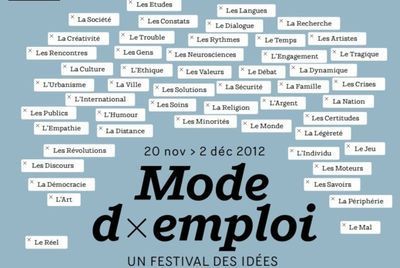Dreamland in Lyon
By LUCY DALLAS
Earlier this month, the Villa Gillet in Lyon hosted its first non-fiction festival, Mode d'emploi – A user's guide (a typically ambitious, and literary, name, with its nod to Georges Perec's La vie: Mode d'emploi). They conquered New York recently with a series of programmes called Walls and Bridges; their summer festival (Les Assises Internationales du Roman), which deals with fiction, has been successfully running now for six years, so naturally they turned their attention to – well, everything else. There were performances, talks, readings, round tables and conferences on newsworthy topics such as sexual identity and public policy, surveillance and security, climate change and our relationship with the animal world, but there was also room and time for more abstract debates: does democracy work, does evil really exist, does religion make us free? (the latter was co-chaired by the TLS's very own Rupert Shortt).
Taking part in the debate on climate change was Andri Magnason, who crystallized the growing environmental movement in Iceland with his book Dreamland, which made a detailed, passionate, witty case against the installation of more aluminium smelting plants in his country. The smelting takes an enormous amount of energy – cheap and plentiful in Iceland, thanks to the geothermal currents there – and the process, Magnason contends, lays waste to the countryside. It also makes Iceland's economy dependent on huge multinationals, rather than its own people; Dreamland was written before the banking crash and when we talked in Lyon he was happy to report that since then, one of the putative smelting plants has been stopped and more small businesses and start-ups are developing, trusting in their own energy and initiative.
Magnason also made a film of Dreamland and is currently filming again so he could perhaps legitimately be described as an environmental campaigner, or a filmmaker, but writing is at the heart of what he does. He likes to confound expectations of what he will write next, and is keen to avoid being pigeonholed: “I wanted to avoid specification. . . I made myself some kind of a rule, to betray your audience. The only way to serve your audience is to betray it.”
His first book was a volume of poetry published and stocked by one of Iceland's biggest supermarkets, Bónus, easily recognizable with its logo of a pink piggy bank on a bright yellow background; “They have Bónus ham, Bónus cola, Bónus toilet paper, Bónus everything . . . so I was wondering what Bónus poetry would look like.” He made a deal with the owner, who stocked the book in the shops, it was a great success, and since then he has published a science-fiction novel, Lovestar, and a children's book, The Story of the Blue Planet (translated into twenty-three languages, at the last count), both out in English in 2013.
He cites Kurt Vonnegut, Richard Brautigan, George Orwell and Mikhail Bulgakov as literary loves, and there is something of each of these in his work – serious, thoughtful satire and inquiry mixed with humour, dry and daft by turns. Yet despite these international influences, it is rooted firmly in Iceland: “A writer always has to have an anchor somewhere”. And what an anchor: “Global warming, the financial crisis, conglomerate corporations, the literary history – what more could you ask for? It's quite a hotspot. I was in the music hall built right after the crisis and . . .Yoko Ono was giving a peace award to Lady Gaga with our mayor dressed like a Jedi knight, and I was thinking, where else should I be?”
Peter Stothard's Blog
- Peter Stothard's profile
- 30 followers




